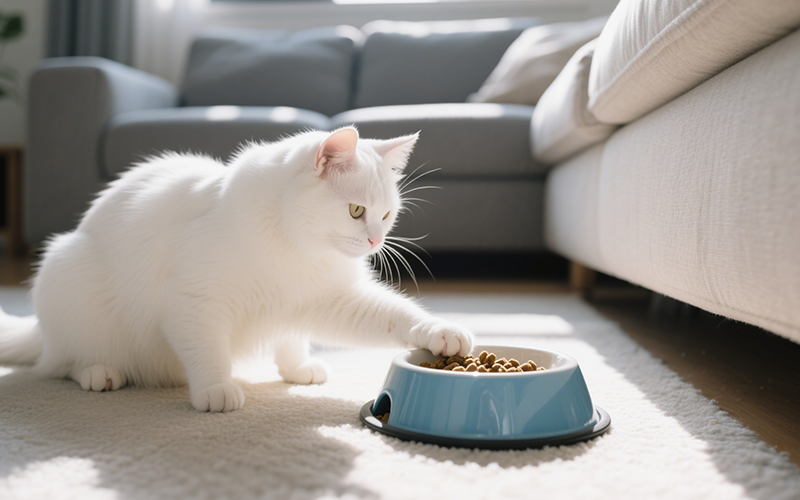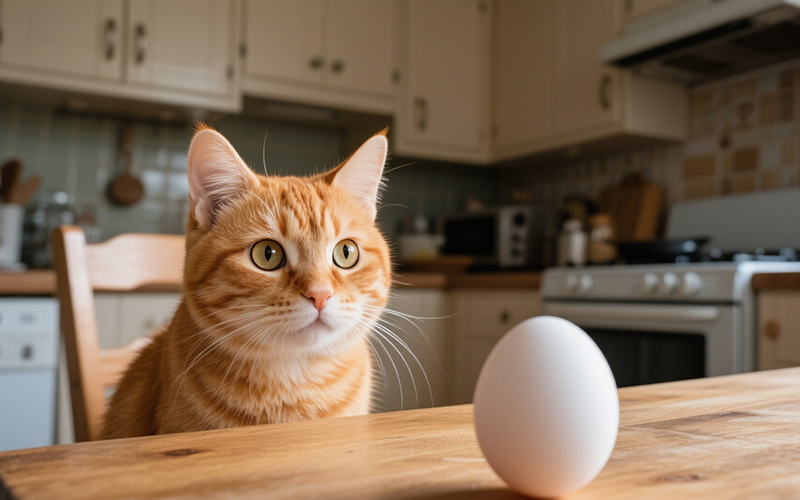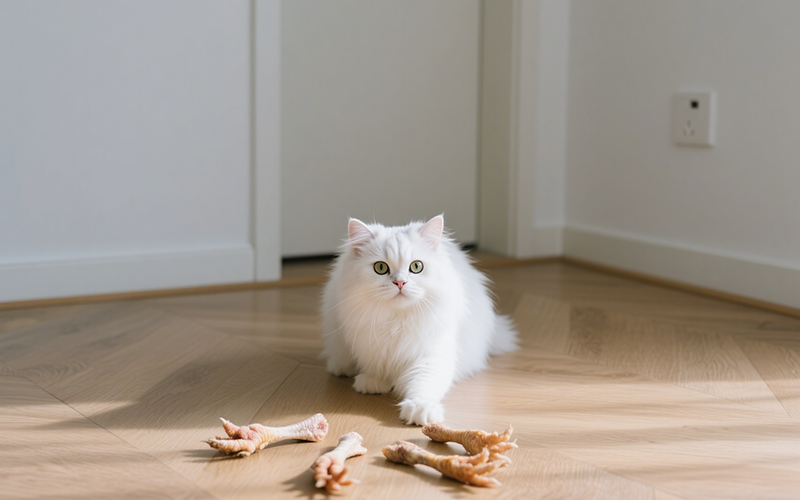Can Cats Eat Dog Kibble? Unpacking the Nutritional Mismatch!
- 29 May 2025 09:30
It's a common scenario in multi-pet households: your cat, with its curious nature, saunters over to the dog's bowl and sneaks a few bites of kibble. This might leave you wondering: can cats eat dog kibble? While a few stolen nibbles are unlikely to cause immediate, severe harm to a healthy adult cat, regularly feeding dog kibble to a cat, or allowing it to become a significant part of their diet, is definitely NOT recommended. Cats and dogs have distinctly different nutritional requirements, and dog food is not formulated to meet the specific needs of felines. This comprehensive guide will explore why this dietary swap is a bad idea in the long run.

Fundamental Differences: Cats vs. Dogs Nutritional Needs
To understand why dog kibble isn't suitable for cats, we must first recognize the fundamental biological differences between the two species:
Cats: Obligate Carnivores
Cats are obligate carnivores. This means their bodies are evolutionarily designed to derive nutrients almost exclusively from animal-based proteins and fats. Key characteristics of their dietary needs include:
High Protein Requirement: Cats need significantly more protein in their diet than dogs. This protein must be high-quality and animal-derived.
Essential Amino Acids (Animal-Sourced):
Taurine: Cats cannot synthesize enough taurine on their own and MUST obtain it from their diet, primarily from animal tissues. Taurine deficiency leads to severe health problems, including blindness (feline central retinal degeneration) and heart disease (dilated cardiomyopathy).
Arginine: Another essential amino acid vital for ammonia detoxification. A single meal deficient in arginine can be dangerous for a cat.
Specific Fatty Acid Needs: Cats require certain fatty acids, like arachidonic acid, which they can only obtain from animal sources. Dogs can synthesize arachidonic acid from other fats.
Vitamin Requirements: Cats need pre-formed Vitamin A (retinol) from animal sources, as they cannot efficiently convert beta-carotene from plants into Vitamin A. They also have higher needs for certain B vitamins.
Lower Carbohydrate Tolerance: Cats have a limited ability to digest and utilize carbohydrates efficiently. Their natural diet is very low in carbs.
Dogs: Omnivores (with Carnivorous Leanings)
While dogs are classified in the order Carnivora, their domestic evolution has led them to be more omnivorous. They can derive nutrients from both animal and plant sources.
Moderate Protein Requirement: Dogs need protein, but generally less than cats.
Can Synthesize Taurine (Usually): Most dogs can synthesize their own taurine from other amino acids (methionine and cysteine), though some breeds or individuals can benefit from taurine supplementation.
Can Synthesize Arachidonic Acid: Dogs can convert linoleic acid (found in plant oils) into arachidonic acid.
Can Convert Beta-Carotene to Vitamin A: Dogs can efficiently convert beta-carotene from plants into active Vitamin A.
Better Carbohydrate Digestion: Dogs are better equipped to digest and utilize carbohydrates than cats.
These fundamental differences are reflected in the formulation of their respective foods. The question "can cats eat dog kibble?" highlights this nutritional disparity.
Why Dog Kibble is Nutritionally Inadequate for Cats
Given their different needs, dog kibble is typically formulated in ways that make it unsuitable as a primary diet for cats:
| Nutritional Aspect | Deficiency/Issue in Dog Kibble for Cats |
| Protein Levels | Often too low for a cat's needs. Cat food typically has a higher protein percentage from animal sources. |
| Taurine Content | CRITICAL DEFICIENCY. Dog food is not typically supplemented with the high levels of taurine that cats require because dogs can usually make their own. A cat eating only dog food will inevitably develop taurine deficiency, leading to serious, irreversible health problems like blindness and fatal heart conditions. |
| Arachidonic Acid | May be insufficient or absent in dog food, as dogs can synthesize it. Cats need it pre-formed from animal fats. Deficiency affects skin, coat, and reproductive health. |
| Vitamin A (Retinol) | Dog food may rely on beta-carotene as a Vitamin A source, which cats cannot efficiently convert. Cats need pre-formed Vitamin A. Deficiency can lead to skin problems, night blindness, and muscle weakness. |
| Niacin (Vitamin B3) | Cats have a higher requirement for niacin than dogs and cannot synthesize it efficiently from tryptophan. Dog food might not provide enough. |
| Carbohydrate Content | Dog kibble often contains higher levels of carbohydrates (from grains, potatoes, peas) than cat food. While not acutely toxic, a high-carb diet is not ideal for cats and can contribute to obesity and potentially increase the risk of diabetes. |
| Fat Content and Type | The overall fat level and the specific types of fatty acids might not align with a cat's optimal needs. |
Consequences of a Cat Regularly Eating Dog Kibble
If a cat consistently eats dog kibble instead of species-appropriate cat food, several health problems can arise over time:
Taurine Deficiency: This is one of the most severe consequences. It can lead to:
Feline Central Retinal Degeneration (FCRD): Irreversible blindness.
Dilated Cardiomyopathy (DCM): A serious heart condition where the heart muscle weakens and enlarges, eventually leading to heart failure.
Reproductive problems and developmental issues in kittens born to deficient mothers.
Nutritional Deficiencies: Lack of adequate protein, arachidonic acid, Vitamin A, and niacin can lead to poor skin and coat, muscle wasting, lethargy, weakened immune system, and other metabolic issues.
Digestive Upset: Some cats might experience vomiting or diarrhea from dog food, especially if it's high in carbohydrates or ingredients they are not used to.
Obesity: The potentially higher carbohydrate content and different caloric density of dog food can contribute to weight gain in cats if portions aren't carefully managed (and even then, it's not ideal nutrition).
Urinary Tract Issues: The mineral balance in dog food is different from cat food. Cat food is often formulated to promote a specific urinary pH to help prevent urinary crystals and stones. Dog food doesn't have these specific feline urinary health considerations.
Poor Growth and Development in Kittens: Kittens have even higher protein and specific nutrient needs than adult cats. Feeding them dog food during their crucial growth phase can have devastating long-term health impacts.
While a few bites of dog kibble by an adult cat on rare occasions is unlikely to cause immediate harm, it should never be a substitute for their regular cat food. The long-term risks associated with the question "can cats eat dog kibble?" are significant.
What If My Cat Occasionally Sneaks Dog Kibble?
If your cat is generally healthy and eats a balanced cat food diet, an occasional stolen mouthful of dog kibble is usually not a cause for major alarm.
Don't Panic: A small amount once in a while won't lead to instant taurine deficiency or other severe issues.
Monitor: Watch for any signs of mild digestive upset like vomiting or diarrhea, especially if they ate more than a few pieces.
Prevent Future Snacking: The main goal is to prevent it from becoming a regular habit.
Tips to Prevent Cats from Eating Dog Kibble:
Feed Separately: Feed your cat and dog in separate rooms or at different times.
Elevate Dog's Bowl: If your dog is larger, consider feeding them from an elevated bowl that your cat can't easily reach.
Controlled Feeding Times: Instead of free-feeding your dog (leaving food out all day), feed them set meals and remove any uneaten food after a certain period (e.g., 15-20 minutes).
Secure Food Storage: Store dog food bags in sealed containers that your cat cannot access.
Automatic Feeders: Some automatic feeders are designed to open only for a specific pet (e.g., via a microchip tag on their collar), which can prevent food stealing.
Make Cat Food More Appealing: Ensure your cat enjoys their own food. Offer variety in textures (wet and dry) and flavors (within cat-appropriate options).
Can Dogs Eat Cat Kibble? (The Reverse Scenario)
Interestingly, while dog food is bad for cats long-term, cat food is also not ideal for dogs, though perhaps less acutely dangerous in small amounts. Cat food is much richer, higher in protein and fat, and more calorically dense than dog food.
For a Dog: Occasional cat food might lead to digestive upset (vomiting, diarrhea) due to its richness. Long-term, it can contribute to obesity and potentially put a strain on a dog's kidneys and liver due to the high protein levels not designed for their system.
It's always best for each pet to eat food specifically formulated for their species.
PettureX: Your AI Assistant for Pet Nutrition Clarifications
Navigating the dietary needs of different pets in one household can lead to questions. The PettureX app is designed as an AI-powered resource for pet owners seeking general information.
PettureX offers:
24/7 AI Consultation: You can ask general questions like "Why can't cats eat dog food long-term?" or "What are the signs of taurine deficiency in cats?" The AI chatbot can provide instant information based on established veterinary nutritional principles. It will explain the differences in dietary needs and highlight the risks of inappropriate feeding, always advising that for specific dietary plans or health concerns, consulting a veterinarian is crucial.
PettureX can help you quickly understand the fundamental reasons behind species-specific diets, supporting your efforts to provide the best nutrition for all your pets.
Conclusion: Dog Kibble is a Feline No-Fly Zone for Regular Meals
To definitively answer "can cats eat dog kibble?" – while an occasional, accidental nibble by a healthy adult cat is unlikely to cause immediate serious problems, dog kibble is nutritionally inadequate and unsuitable as a regular food source for felines. The lack of sufficient protein, taurine, arachidonic acid, and proper vitamin balance can lead to severe and irreversible health issues over time.
Always ensure your cat is fed a high-quality commercial cat food formulated to meet their unique needs as obligate carnivores. If you have a multi-pet household, take steps to prevent food swapping to ensure both your cat and dog receive the species-appropriate nutrition they require to thrive.
Frequently Asked Questions (FAQs)
Q1: What if my cat really seems to prefer the dog's kibble?
A: Sometimes cats are attracted to dog food due to different flavors, aromas, or even just the novelty. However, their preference doesn't mean it's good for them. Try to make their own cat food more appealing:
Offer a variety of high-quality cat food flavors and textures (wet and dry).
Warm wet food slightly to enhance its aroma.
Add a cat-safe food topper (like a sprinkle of plain cooked chicken or fish flakes).
Ensure their feeding environment is calm and stress-free.
If pickiness persists, consult your vet to rule out underlying medical issues.
Q2: How long would it take for a cat to show signs of deficiency from eating dog kibble?
A: This can vary greatly depending on the cat's age, previous nutritional status, how much dog food they are eating versus cat food, and the specific formulation of the dog food. Taurine deficiency, for example, can take several months to over a year to manifest clinically with signs of vision loss or heart problems, but the damage is often already significant by then.
Q3: Is wet dog food any better for cats than dry dog kibble?
A: No, wet dog food still suffers from the same fundamental nutritional imbalances for cats as dry dog kibble (e.g., insufficient protein, lack of adequate taurine). The form (wet vs. dry) doesn't change the fact that it's formulated for canine, not feline, needs.
Q4: Are there any "all life stages" or "multi-pet" foods that are safe for both cats and dogs?
A: True "multi-pet" foods that adequately meet the distinct needs of both obligate carnivore cats and omnivorous dogs are very rare and difficult to formulate correctly. Most "all life stages" foods are still species-specific (e.g., "all life stages cat food" or "all life stages dog food"). It's always best to feed species-specific diets. If you see a food marketed for both, scrutinize the nutritional analysis and ingredient list very carefully, and ideally, discuss it with your veterinarian.
Q5: My dog has a prescription diet. Is it extra bad if my cat eats that?
A: Yes, it could be. Prescription diets are formulated to manage specific health conditions in dogs (e.g., kidney disease, urinary issues, allergies). These formulations can be even more unsuitable or potentially harmful for a cat than regular dog food, as they might have restricted levels of certain nutrients (like protein or phosphorus) that cats actually need in higher amounts, or include ingredients targeted for a canine medical issue that are irrelevant or detrimental to a cat.
Q6: If my cat only eats a tiny bit of dog kibble each day, is that still a concern?
A: Even small, regular amounts contribute to an imbalanced diet over time and can displace the intake of their nutritionally complete cat food. While less immediately dangerous than if it were their sole diet, it's still not ideal and should be prevented if possible. The primary concern remains the cumulative effect of missing out on essential feline-specific nutrients like taurine.
Related

Can Cats Eat Egg Yolk Raw? A Vet's In-Depth Guide to Feline Nutrition & Safety
- 10 Jun 2025
Can Cats Eat Deli Turkey? Slicing Through the Facts for Your Feline!
- 29 May 2025
Can Cats Eat Deer Meat? Exploring Venison for Your Feline!
- 28 May 2025
Can Cats Eat Corned Beef? Unpacking This Salty Human Delicacy!
- 28 May 2025
Can Cats Eat Cooked Rice? The Grain Truth for Your Feline Friend!
- 27 May 2025
Can Cats Eat Cornbread? A Crumb of Truth for Curious Cat Owners!
- 27 May 2025
Can Cats Eat Cooked Meat? Sizzling Facts for Your Feline's Feast!
- 26 May 2025
Can Cats Eat Chili? Spicing Up the Truth About This Human Dish!
- 26 May 2025
Can Cats Eat Chicken Eggs? Cracking the Code on This Feline Food Query!
- 24 May 2025
Can Cats Eat Chicken Feet? A Paw-sitive or Negative Treat?
- 24 May 2025
